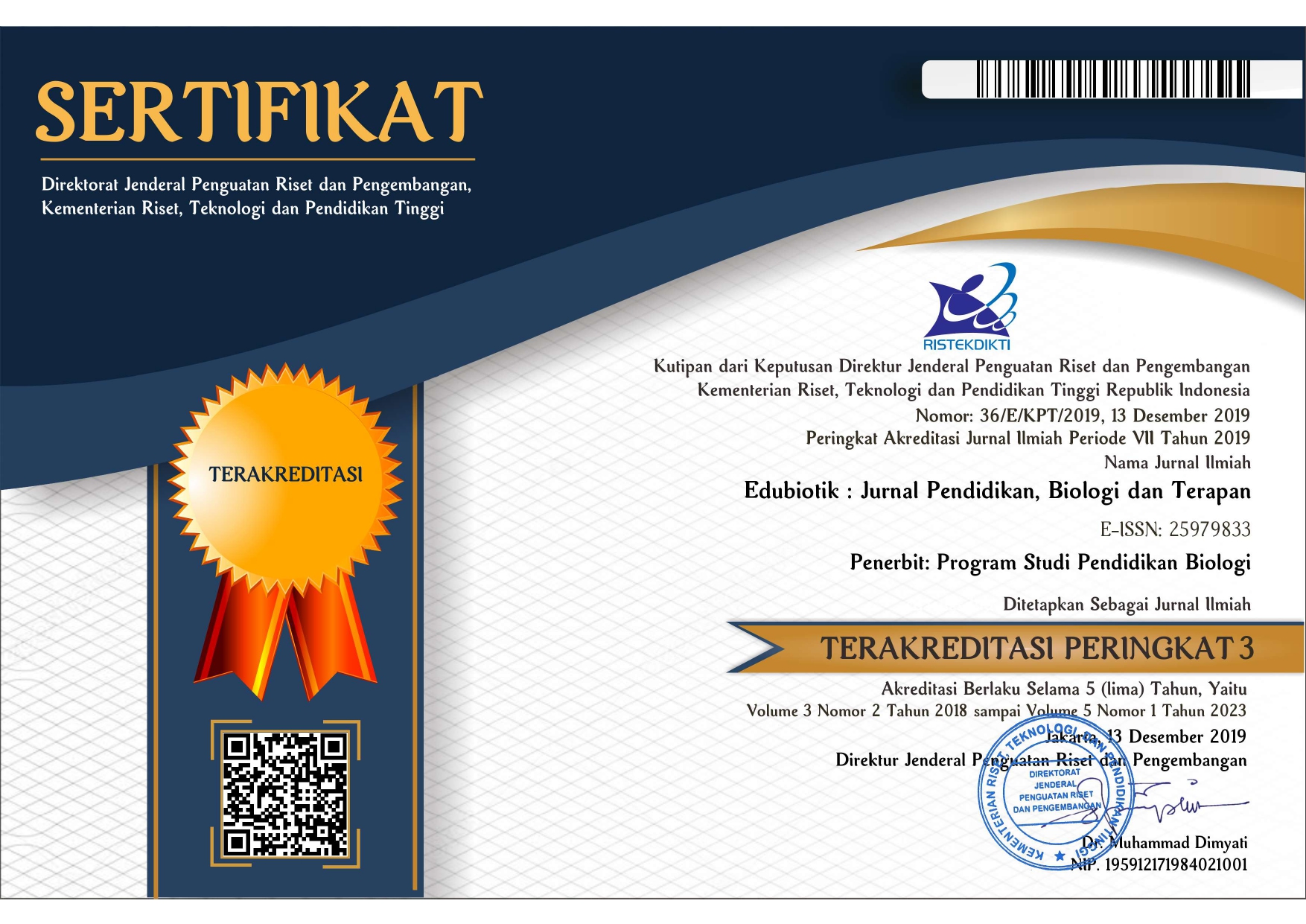The relationship between student's perceptions of the learning environment with learning outcomes of the immune system in distance learning
Abstract
Students' perception of the learning environment is the process of students interpreting the learning experiences they receive. The learning environment is an external factor that has an important role in the learning process, namely as a place to facilitate students and teachers in achieving learning goals. Therefore, it is necessary to have a good learning environment so that the learning process runs smoothly and students' perceptions of the learning environment become positive because this is related to student learning outcomes. This study aims to determine the relationship between student's perceptions of the learning environment with learning outcomes of the immune system in distance learning. This research was conducted at SMA Negeri 21 Jakarta in June of 2020/2021. The method used was quantitative with a correlational study. The sample in this study was 105 students of class XI MIPA who were selected by simple random sampling. The research instrument for students' perceptions of the learning environment uses the Dundee Ready Education Environment Measure (DREEM) questionnaire with a measurement scale, namely the Likert scale. In contrast, the immune system learning outcome instrument in distance learning is a test based on basic competence (KD) and competency achievement indicators (GPA). The test is in the form of multiple-choice with five answer choices. Giving a score for each question if it is correct, will get a score of 1 and if the answer is wrong it will get a score of 0. The prerequisite Test shows the data is normally distributed and homogeneous. Based on the statistical hypothesis testing results, a significant regression model and the correlation coefficient have a strong relationship. Furthermore, the coefficient of determination was calculated and the R Square value was obtained which indicated that students' perceptions of the learning environment were related to the learning outcomes of the immune system in distance learning.
References
Al-Samarraie, H., & Saeed, N. (2018). A systematic review of cloud computing tools for collaborative learning: opportunities and challenges to the blended- learning environment. Compuers & Education. 124, 77–91. 10.1016/j.compedu.2018. 05.016
Amrullah, A. F., Sulistiawati, S., & Purnamasari, C. B. (2020). The relationship of the students’ perception on the campus learning environment and their GPA in School of Medicine of Mulawarman University. Jurnal Ilmu Kesehatan, 8(1), 15–21. https://doi.org/10.30650/jik.v8i1.293
Aripin, I. (2019). Pendidikan nilai pada materi konsep sistem imun. Jurnal Bio Educatio, 4(1), 1–12. https://www.jurnal.unma.ac.id/index.php/BE/article/viewFile/1297/1207
Askari, H., Mansoori, N., Saeed, M. Z., Riaz, K., Mukhtar, A., Rana, M. N., & Mubeen, S. M. (2018). The dundee ready education environment measure (dreem): perception of educational environment and its impact on academic performance of medical and pharmacy students. Annals of Jinnah Sindh Medical University, 4(2), 59-63. https://www.researchgate.net/publication/340284950
Azka, S. H. M., Indriyanti, D. R., & Widianti, T. (2016). Keefektifan media pembelajaran “SI IMUT” berbasis masalah materi sistem imun terhadap sikap peka dan peduli keselamatan diri dan lingkungan siswa. Journal of Biology Education, 5(3), 237–246. https://journal.unnes.ac.id
Bangun, D. (2008). Hubungan persepsi siswa tentang perhatian orang tua, kelengkapan fasilitas belajar dan penggunaan waktu belajar di rumah dengan prestasi belajar ekonomi. Jurnal Ekonomi & Pendidikan, 5(April), 74–94. https://doi.org/10.21831/jep.v5i1.604
Caliskan, H. (2015). An Investigation into the organization levels of social studies teachers with regard to constructivist learning environments in terms of several variables. Journal of Social Studies Education Research, 6(1), 49–83. https://jsser.org/index.php/jsser/article/view/322/314
Daryanti, M. S. (2018). Hubungan lingkungan belajar dengan prestasi belajar mahasiswa. Jurnal Kebidanan Dan Keperawatan Aisyiyah, 12(1), 84–89. https://doi.org/10.31101/jkk.129
Dost, S., Hossain, A., Shehab, M., Abdelwahed, A., & Lana Al- Nusair, L. (2020). Perceptions of medical students towards online teaching during the COVID-19 pandemic: a national cross- sectional survey of 2721 UK medical students. BMJ Open, 10:e042378. https://doi.org/10.1136/ bmjopen-2020-042378
Eom, S. B., Josephwen, H., & Ashill, N. (2016). The determinants of students’ perceived learning outcomes and satisfaction in university online education: An empirical Investigation. Decision Sciences Journal of Innovative Education, 4(2), 215–235. https://doi.org/10.1111/dsji.12097
Ernawati, R., Toharudin, U., & Ibrahim, Y. (2017). Penerapan model pembelajaran aktof-kooperatif tipe LSA terhadap peningkatan hasil belajar siswa SMA pada sub konsep sistem imun manusia. Biosfer: Jurnal Pendidikan Biologi, 10(2), 12–29. https://doi.org/10.21009/biosferjpb.10-2.3
Gustia, L., & Suhartini, S. (2021). Students’ interest and cognitive learning outcomes: Biology education in High Schools during COVID-19. Biosfer: Jurnal Pendidikan Biologi, 14(1), 75–85. https://doi.org/10.21009/biosferjpb.18663
Haesamu, Ahiri, J., & Safar, M. (2019). Hubungan antara lingkungan belajar dan kecerdasan emosional dengan hasil belajar kewirausahaan siswa kelas XI SMK Negeri di Kota Kendari. Wahana Kajian Pendidikan IPS, 3(2), 9–19. https://doi.org/10.33772/JWKP-IPS
Henriksen, D., Creely, E., & Henderson, M. (2020). Folk pedagogies for teacher transitions: Approaches to synchronous online learning in the wake of COVID-19. Journal of Technology and Teacher Education, 28(2), 201-209. https://www.learntechlib.org/primary/p/216179/
Husain, S. (2011). Kreativitas Guru dalam merancang lingkungan sebagai sumber belajar pada mata pelajaran produktif di SMK Kota Gorontalo. Jurnal Penelitian dan Pendidikan,8(1), 9-50. http://repo.uinsatu.ac.id/11347/6.haspreviewThumbnailVersion/BAB%20III.pdf
Husamah, H., & Pantiwati, Y. (2014). Cooperative learning STAD-PJBL: Motivation, thinking skills, and learning outcomes of biology department students. International Journal of Education Learning and Development, 2(1), 77–94. https://www.eajournals.org/journals/international-journal-of-education-learning-and-development-ijeld/vol-2-issue-1-march-2014/cooperative-learning-stad-pjbl-motivation-thinking-skills-learning-outcomes-biology-department-students/
Ibem, E., Alagbe, O., & Owoseni, O. (2017). A study of student’s perception of the learning environment: case study of department of architecture, convenant university, Ota Ogun state. Proceedings of INTED2017 Conference 6th-8th March 2017, Valencia, Spain, 6275-6286. https://core.ac.uk/download/pdf/83592984.pdf
Idola, S., Sano, A., & Khairani. (2016). Hubungan antara persepsi siswa tentang keadaan lingkungan fisik sekolah dengan motivasi belajar. Jurnal Pendidikan Indonesia, 2(2), 30–34. http://dx.doi.org/10.29210/12016263
Jayanti, P., Hariani, D., & Kuswanti, N. (2017). Validitas dan efektivitas LKS berbasis pembelajaran aktif dengan metode bermain peran pada materi sistem imun. BioEdu, 6(1), 1–8. https://ejournal.unesa.ac.id/index.php/bioedu/article/view/18838
Lawrence, A. (2012). School environment and academic performance of standard six students.Journal of Educational and Industrial Studies in the World, 2(3), 210-215. https://files.eric.ed.gov/fulltext/ED542331.pdf
Martin, F., Ritzhaupt, A., Kumar, S., & Budhrani, K. (2019). Award-winning faculty online teaching practices: course design, assessment, evaluation and facilitation. Int. High. Educ. 42, 34–43. doi: 10.1016/j.iheduc.2019.04.001
Megawanti, P., Megawati, E., & Nurkhafifah, S. (2020). Persepsi peserta didik terhadap pjj pada masa pandemi covid-19. Faktor Jurnal Ilmiah Kependidikan, 7(2), 75–82. http://dx.doi.org/10.30998/fjik.v7i2.6411
Mustami, M. K. (2019). The relationship between self-adjustment, social support from peers, and self-regulation with learning outcomes among high school students in biology. Pertanika: Journal Sciences and Humanities, 27(2), 925–935. http://www.pertanika.upm.edu.my
Nadeem, A., Iqbal, N., Yousaf, A., Ahmed, M., Daud, B., Younis, A., Military, C., & Attock, H. (2014). Students’ perception of educational environment at Army Medical College, Rawalpindi: assesment by DREEM. Educational Environment, 64(2), 298–303. https://pesquisa.bvsalud.org/portal/resource/pt/emr-154713
Nurhasanah, S., & Sobandi, A. (2016). Minat belajar sebagai determinan hasil belajar siswa. Jurnal Pendidikan Manajemen Perkantoran (JPManper), 1(1), 128–135. https://doi.org/10.17509/jpm.v1i1.3264
Puriana, R. H., Hayati, Hanafi, M., Rizkanto, B. E., Mahardika, R., & Utamayasa, I. G. D. (2021). Penyuluhan penguatan sistem imun sebagai proteksi COVID-19 untuk guru SMP Negeri 1 Perak Jombang. Kanigara: Jurnal Pengabdian Kepada Masyarakat, I(I), 77–82. https://doi.org/10.36456/kanigara.v1i1.3226
Purwanto, A, Pramono, R, Asbari, M, Hyun, C. C, Wijayanti, L. M., & Putri, R, S. (2020). Studi eksploratif dampak pandemi COVID-19 terhadap proses pembelajaran online di sekolah dasar. EduPsyCouns: Journal of Education, Psychology and Counseling, 2(1), 1–12. https://ummaspul.e-journal.id/Edupsycouns/article/view/397
Raida, S. A. (2018). Identifikasi materi biologi SMA sulit menurut pandangan siswa dan guru SMA se-Kota Salatiga. Journal of Biology Education, 1(2), 209–222. http://journal.stainkudus.ac.id/index.php/jbe%0AIdentifikasi
Rustiana, A., & Chalifah, N. (2012). Pengaruh lingkungan belajar dan kompetensi profesional guru terhadap prestasi belajar siswa SMA N 1 Jekulo Kudus. Jurnal Pendidikan Ekonomi Dinamika Pendidikan, VII(1), 14 – 28. https://journal.unnes.ac.id/nju/index.php/DP/article/view/4914/4062
Sartono, N., Rusdi., & Handayani, R. (2017). Pengaruh pembelajaran process oriented guided inquiry learning (POGIL) dan discovery learning terhadap kemampuan berpikir analisiss iswa SMAN 21 Jakarta pada materi sistem imun. Biosfer: Jurnal Pendidikan Biologi (Biosferjpb), 10(1), 58–64. https://doi.org/10.21009/biosferjpb.10-1.8
Setyorini, I. (2020). Pandemi covid-19 dan online learning: apakah berpengaruh terhadap proses pembelajaran pada kurikulum 13?. Journal of Industrial Engineering & Management Research, 1(1), 95-102. https://doi.org/10.7777/jiemar.v1i1.31
Sigit, D. V., Putrawan, I. M., & Sulfitania, C. (2016). Studi komparatif hasil belajar biologi didasarkan pada persepsi siswa terhadap iklim kelas (classroom environment scale/CES): studi ex post facto pada siswa di SMA N 1 Jakarta. Biosfer: Jurnal Pendidikan Biologi, 9(2), 23–38. https://doi.org/10.21009/biosferjpb.9-2.4
Sukmawati, Y. R., Sari, D. P., & Susani, Y. P. (2019). Hubungan persepsi siswa terhadap lingkungan belajar, partisipasi dan kinerja akademik di sekolah kedokteran. Jurnal Pendidikan Kedokteran Indonesia: The Indonesian Journal of Medical Education, 8(2), 53–60. https://doi.org/10.22146/jpki.46118
Sumantri, M. S., & Fitriayani, E. (2015). Hubungan antara sikap terhadap pendidikan kesehatan dan lingkungan belajar terhadap hasil belajar pendidikan kesehatan siswa kelas v sekolah dasar. Edutech, 1(1), 35–51. https://ejournal.upi.edu
Sutarto, S., Sari, D. P., & Fathurrochman, I. (2020). Teacher strategies in online learning to increase students’ interest in learning during COVID-19 pandemic. Jurnal Konseling Dan Pendidikan, 8(3), 129–137. https://doi.org/10.29210/147800
Thobroni, M. (2015). Belajar dan pembelajaran teori dan praktik. Ar- Ruzz Media.
Tompodung, L. M. (2017). Persepsi mahasiswa terhadap lingkungan pembelajaran di Universitas Sam Ratulangi Manado. Jurnal e-Biomedik (eBm), 5(2), 1-6. https://doi.org/10.35790/ebm.5.2.2017.17072
Trisnaningsih, S., Suyanto, S., & Rahayu, T. (2016). Pengembangan learning management system quipper school pada pembelajaran materi sistem pertahanan tubuh untuk meningkatkan motivasi dan hasil belajar siswa kelas XI di SMA Negeri 3 Yogyakarta. Jurnal Pendidikan Biologi, 5(6), 28–36. http://staffnew.uny.ac.id/upload/131930139
Usman, Y. D., & Madudili, C. G. (2019). Evaluation of the effect of learning environment on student’s academic performance in Nigeria. Online Submission, 1–9. https://eric.ed.gov/?id=ED602097
Utami, H. D., Yuniastuti, A., & Rudyatmi, E. (2018). Efektivitas model pembelajaran problem based learning dengan asesmen portofolio pada materi sistem imun. Journal of Biology Education, 7(2), 202–208. https://doi.org/10.15294/jbe.v7i2.25518
Wibowo, D. C., Deta, Y., & Dores, O. J. (2020). Efektivitas belajar dari rumah di tengah pandemi COVID-19. Jurnal Pendidikan Dasar Perkhasa, 6(2), 228–241. https://doi.org/10.31932/jpdp.v6i2.893
Widyaningtyas, A., Sukarmin., & Radiyono, Y. (2013). Peran lingkungan belajar dan kesiapan belajar terhadap prestasi belajar fisik siswa kelas Sekolah Menengah Atas Negeri 1 Pati. Jurnal Pendidikan Fisika, 1(1), 136-143. https://jurnal.fkip.uns.ac.id/index.php/pfisika/article/view/1773/1268
Wijaya, I. K. W. B., Krisdayanthi, A., & Andayani, K. Y. (2020). Pola pembelajaran IPA siswa di rumah. Perspektif Pendidikan, 23.
Woolfolk, A. (2012). Educational psychology (12th ed.). Pearson Education.
Yuranda, G.S., & Nurhayati. (2016). Hubungan persepsi lingkungan pembelajaran dengan hasil belajar mahasiswa Prodi Pendidikan Dokter FKIK UMY. Skripsi. UMY. Yogyakarta.
Zuriati, S., & Briando, B. (2020). Persepsi siswa terhadap pembelajaran online di masa pandemi pada SMAN 4 Tanjungpinang. Webinar and Call for Papers “Menyongsong Era Merdeka Belajar,” June. https://www.researchgate.net/publication/342330009





.png)
2.png)

1.jpg)


